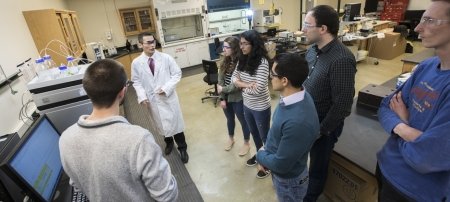World Water Day: Making a Difference, One Drop at a Time
Every day, more than one billion people don’t have access to clean water. More than two billion don’t have access to adequate sanitation facilities. As the world’s population expands, those numbers are only growing. In 1992, the United Nations decided it was time to dedicate a day to doing something about it, and thus World Water Day was established.
World Water Day events at Michigan Tech are spearheaded by the Center for Water and Society, a group of more than 80 faculty members, staff and students involved in research and education on water issues. This is its fourth year sponsoring events, including lectures and a poster competition in the Rozsa Center. This year keynote speaker Nancy Langston, an environmental historian, will give a lecture about sustaining Lake Superior.
World Water Day got its start at the 1992 United Nations Conference on Environment and Development in Rio de Janeiro. First observed on March 22, 1993, its goal was to promote awareness of global water availability and quality issues and educate people about water conservation, relief efforts and what they can do to help. Each year UN-sponsored events focus on a different theme picked by UN-Water, the United Nations branch promoting sustainable water use. The theme for 2011 is “Water for Cities: Responding to the Urban Challenge,” facing water quality issues in the growing urban world.
Water availability is a major problem for many developing countries, particularly in dry regions. Even when water is available, it may not be safe to drink or use. “Clean water is something a lot of people in the developed world, especially in a water-rich place like Michigan, take for granted, “says environmental engineering and applied ecology student Kaye LaFond. “But there are places where people have to choose between going thirsty or getting sick. Water scarcity is the main up-and-coming global issue.”
However, it’s far from only being a problem for developing countries.
“There are a lot of water issues that affect us, even here in the Great Lakes,” says Mayer. He ticks off examples”
- Invasive species like zebra mussels and Asian carp disrupt the ecosystem.
- Climate change warms the water, which means more of it evaporates and there’s less ice in winter.
- There are outbreaks of algae blooms caused by excessive nutrients in water from fertilizer runoff, causing health problems in addition to aesthetic ones.
- Toxic chemicals and metals left behind by industry pollute local water sources. Some sewer systems can’t handle the increased flow from heavy rain and discharge sewage into lakes, causing high levels of hazardous microorganisms.
- Some watersheds in the Great Lakes region even have scarcity issues from pumping groundwater, which reduces aquifer levels and water flow to streams.
“We try to get speakers who look at many different water issues so we can attack these problems from multiple perspectives,” Mayer says. Technology, ecology, sociology and economics—we need to cross disciplines and look at the problems from every angle. We don’t just train scientists and engineers. We talk to people too, gain their trust, inform them about the issues and encourage them to learn and help.”
Even little things can help make a difference. An easy tip from Mayer- “Don’t buy bottled water. There are some times when it makes sense, but water from a tap is often just as good, and it uses less energy and produces less waste. Reusable water bottles are only getting cheaper. It’s just an all-around better choice.”
World Water Day events at Michigan Tech on March 22, 2011 include:
- Center for Water and Society reception and poster display, 4:00-7:00 p.m. in the Rosza Center lobby.
- “Sustaining Lake Superior,” lecture by Nancy Langston, 7:30 p.m. in the Minerals and Materials Engineering Building, room U115.
Michigan Technological University is an R1 public research university founded in 1885 in Houghton, and is home to nearly 7,500 students from more than 60 countries around the world. Consistently ranked among the best universities in the country for return on investment, Michigan's flagship technological university offers more than 185 undergraduate and graduate degree programs in science and technology, engineering, computing, forestry, business, health professions, humanities, mathematics, social sciences, and the arts. The rural campus is situated just miles from Lake Superior in Michigan's Upper Peninsula, offering year-round opportunities for outdoor adventure.




Comments